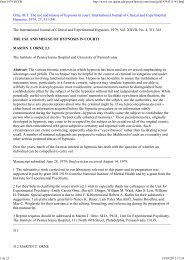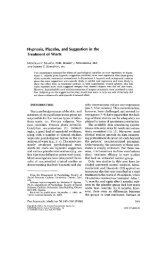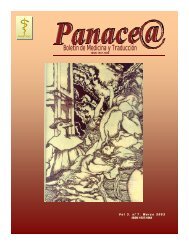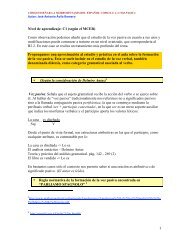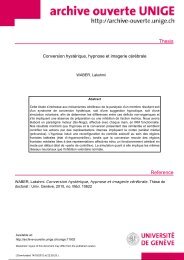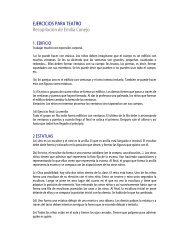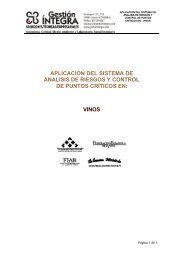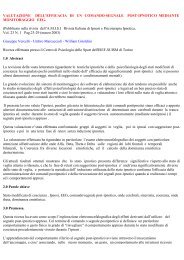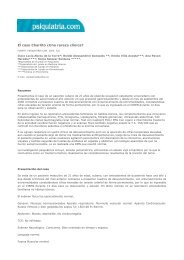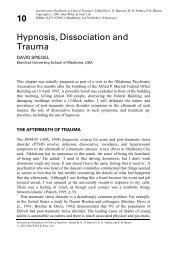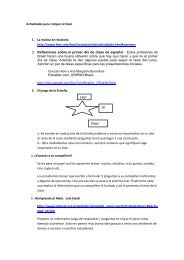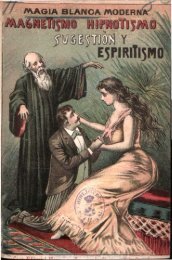Diccionario etimológico comparado de la lengua castellana
Diccionario etimológico comparado de la lengua castellana
Diccionario etimológico comparado de la lengua castellana
You also want an ePaper? Increase the reach of your titles
YUMPU automatically turns print PDFs into web optimized ePapers that Google loves.
2742 GAÑAN GARAB<br />
3. fig. y fam. Persona que tiene arte ó maña<br />
para sonsacar á otra su secreto.<br />
4. Gcrm. ejecutor <strong>de</strong> <strong>la</strong> justicia:<br />
Pí<strong>de</strong>le perdón Oanzua, Como es uso eu ese paso.<br />
Bo7n. Oerm. R. lo.<br />
Gañán, ni.<br />
ETIM.— Del portugués ganham, ganhao;<br />
el cual se <strong>de</strong>r. <strong>de</strong>l árabe gannám,<br />
(con el art. al-gannám), pastor; <strong>de</strong><br />
don<strong>de</strong> el porf. aiit. al-ganame, que significa<br />
lo mismo, <strong>de</strong>rivado <strong>de</strong> ganam,<br />
carneros. Del port. ganliam formóse el<br />
esp. GAÑAN, primit. <strong>de</strong> gañanía (cfr.).<br />
Etimológ. GAÑAN significa pastor. Cfr.<br />
gañanía .<br />
SIGN. — 1. Mozo <strong>de</strong> <strong>la</strong>bianza :<br />
Por acudir el siervo <strong>de</strong> Dios con mas diligencia á visitar<br />
sus gañanes y <strong>la</strong>bores, andaba en un rocinillo.<br />
Siguens. Hist. part. 3. DiscT-<br />
2. fig. Hombre fuerte y rudo.<br />
Fr. // Refr. — PIERDE EL GAÑÁN PORQUE LOS<br />
AÑOS SE LE VAN. ref. que da á enten<strong>de</strong>r que<br />
para el trabajo penoso <strong>de</strong>l campo es necesaria<br />
<strong>la</strong> fuerza y robustez <strong>de</strong> <strong>la</strong> mocedad.<br />
Gañan-ía. f.<br />
Cfr. etim. gañán. Suf. -ta.<br />
SIGN. - 1. Conjunto <strong>de</strong> gañanes:<br />
Le llevaron los Frailes porque se recrease, hacia <strong>la</strong><br />
Granja <strong>de</strong> Val<strong>de</strong>fuentes, y á Santa Cecilia, don<strong>de</strong> es<br />
taha <strong>la</strong> casa <strong>de</strong> <strong>la</strong> gañanía. Siguenz. Hiat. par. 3, Hb. 2,<br />
Disc. 7.<br />
2. Casa en que se recogen.<br />
Gañ-ido. m.<br />
Cfr. etim. gañir. Suf. -ido.<br />
SIGN.— 1. Aullido <strong>de</strong>l perro cuando le maltratan<br />
:<br />
Su voz es un .gañido <strong>la</strong>rgo como que remeda al peí ro.<br />
Esp. Art. Ball. lih. 2, cap. 38.<br />
2. Quejido <strong>de</strong> otros animales.<br />
Gañ-il-es. m. pl.<br />
Cfr. etim. gañih. Suf. -il.<br />
SIGN.— 1. Partes carti<strong>la</strong>ginosas <strong>de</strong>l animal,<br />
en que se forma <strong>la</strong> voz ó el gañido, y <strong>la</strong>s carnosas<br />
<strong>de</strong> que éstas se visten.<br />
2. Agal<strong>la</strong>s <strong>de</strong>l atún.<br />
Gañ-ín. m.<br />
Cfr. etim. gañir. Suf. -m.<br />
SIGN.—pr. Ast. y Sant. Hombre suave en<br />
sus formas, pero falso y <strong>de</strong> ma<strong>la</strong> intención en<br />
el fondo.<br />
Gañ-ir. n.<br />
ETIM.— Del <strong>la</strong>t. gannire, gañir, aul<strong>la</strong>r<br />
el perro con sonido ronco ó triste,<br />
( Gannire quum sit propie can-um,<br />
Varro asinos ru<strong>de</strong>re^ canes gannire,<br />
pullos pipare dixit. Non. 450, 11.<br />
Siendo el gañir propiamente <strong>de</strong> los<br />
perros, Varrón dijo que los perros gañen,<br />
los asnos rebuznan y los pollos<br />
pian). Derívase gannire <strong>de</strong>l primitivo<br />
*can-n-irey <strong>de</strong>riv. <strong>de</strong> canis, cuya etim.<br />
—<br />
cfr. en can. De gannire <strong>de</strong>scien<strong>de</strong> ganniíus,<br />
aullido <strong>de</strong>l perro; prim. <strong>de</strong> gañido<br />
(cfr.), y <strong>de</strong> gañir se <strong>de</strong>rivan gañil-es y<br />
gañín (=que hab<strong>la</strong> quejándose para<br />
engañar á los oyentes). Etimológ. gañir<br />
significa aul<strong>la</strong>r el perro., ó como per/'o.<br />
Cfr. CANALLA, CANÍCULA, etC.<br />
SIGN.— 1. Aul<strong>la</strong>r el perro con gritos agudos<br />
y repetidos cuando le maltratan.<br />
2. Quejarse algunos animales con voz semejaniH<br />
al gañido <strong>de</strong>l perro.<br />
3. Graznar <strong>la</strong>s aves.<br />
4. íig. y fam. Se dice <strong>de</strong> <strong>la</strong>s personas cuando,<br />
enronquecidas, apenas pue<strong>de</strong>n hab<strong>la</strong>r ni<br />
echar <strong>la</strong> voz :<br />
Sintió <strong>la</strong> pobre dueña, que <strong>la</strong> asian <strong>de</strong> <strong>la</strong> garganta<br />
tan fuertemente, que no <strong>la</strong> <strong>de</strong>jaban gañir. Cerv. Quij.<br />
tom. 2. cap. 48<br />
Gañivete. ni.<br />
Cfr. etim. cañivete.<br />
SIGN.—ant. cañivete :<br />
Hasta hincar <strong>la</strong> punta <strong>de</strong>l gañivete en una tab<strong>la</strong>. Lag.<br />
Diosc. lib 4. cap. 92.<br />
Gañ-ón. ra.<br />
ETIM.— Del <strong>la</strong>t. canna (gutturis), el<br />
canal ó conducto <strong>de</strong> <strong>la</strong> respiración.<br />
Para <strong>la</strong> etimol. <strong>de</strong> canna cfr. caña y<br />
para <strong>la</strong> <strong>de</strong> gaítur, -uris, <strong>la</strong> gorja ó garganta,<br />
gu<strong>la</strong> ó caña <strong>de</strong>l cuello, cfr. gutur-al.<br />
De canna=caña formóse *cañ-<br />
ÓN=GA-ÑON y gañ-ote, por medio <strong>de</strong> los<br />
sufijos -on y -ote Cfr. cañada, cañaver-al,<br />
etc.<br />
SIGN. — gañote :<br />
Bebida con aguamiel, quita <strong>la</strong> ronquera y limpia el<br />
gañón. Herr. Agrie, lib. 4, cap. 23.<br />
Gañ-ote. m.<br />
Cfr. etim. gañón. Suf. -ote.<br />
SIGN.— 1. fam. garganta, 1.* y 2.' aceps.<br />
2. pr. Ej-tr. Género <strong>de</strong> fruta <strong>de</strong> sartén, que<br />
se hace <strong>de</strong> masa muy <strong>de</strong>licada, con <strong>la</strong> figura y<br />
forma <strong>de</strong>l gañote.<br />
Gao. m.<br />
ETIM.— De *<strong>la</strong>o-, <strong>de</strong>rivado <strong>de</strong>l tema<br />
teutónico *lus-, piojo, al que correspon<strong>de</strong>n<br />
: al. <strong>la</strong>us, pl. lüuse; dan. lus, plur.<br />
lus; sueco lus, pl. lóss; isl. lús, plural<br />
lyss; med. ingl. lous, pl. lys, lis; ingl.<br />
louse, etc.<br />
SIGN.-Ge/vn. piojo,<br />
1.* acep.<br />
Gaón. m.<br />
Cfr. etim. en el Apéndice.<br />
SIGN.—Mar. Remo compuesto <strong>de</strong> una tab<strong>la</strong><br />
ova<strong>la</strong>da ó circu<strong>la</strong>r, sujeta con varias trincas<br />
que <strong>la</strong> atraviesan al extremo <strong>de</strong> una caña ó<br />
varal.<br />
Garabat-ada. f<br />
Cfr. etim. garabato. Suf. -ada.<br />
SIGN.— Acción <strong>de</strong> echar el garabato para<br />
asir una cosa y sacar<strong>la</strong> <strong>de</strong> don<strong>de</strong> está metida:<br />
A



